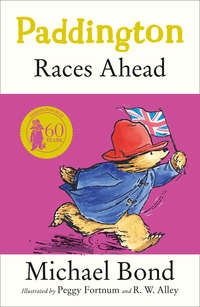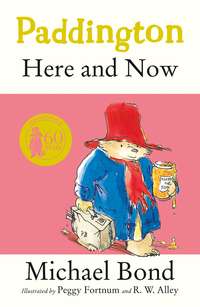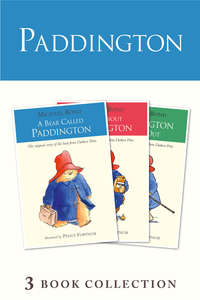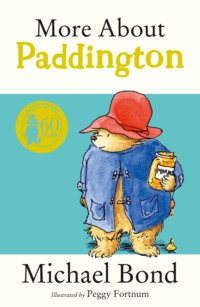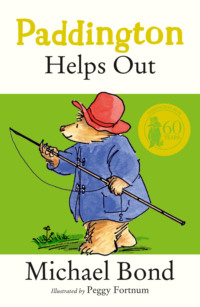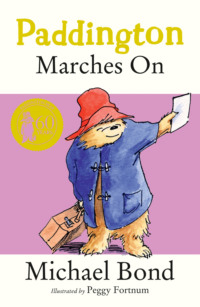
Полная версия
Paddington Complete Novels
The list of items Mr Gruber bought grew and grew until Paddington felt quite dizzy with writing down all the figures and he was pleased when at last he announced that he had finished buying for the day.
“A very good day’s work indeed, Mr Brown,” he said, as he checked Paddington’s figures. “And thank you very much for all your help. I don’t know what I would have done without you.”
Paddington looked up from his own catalogue which he had been studying earnestly. “That’s all right, Mr Gruber,” he said vaguely. “Excuse me, but what is a preserves stand?”
“A preserves stand?” said Mr Gruber. “Well, it’s a thing for holding jam or marmalade.”
Paddington’s eyes gleamed as he started to unlock his suitcase. “I think I shall bid for that, Mr Gruber,” he said excitedly, as he peered inside the secret compartment to see how much money he had. “It’s the next item in the catalogue. I think I should like a preserves stand for my marmalade.”
Mr Gruber looked at him rather nervously. “I should be careful if I were you, Mr Brown,” he said. “It may be an antique one. If it is it’s probably worth a lot of money.”
But before he had time to explain to Paddington just how much it might cost him the auctioneer rapped on his table for silence.
“Lot 99,” he shouted, as he held up a piece of shining silver to the light. “A very unusual kind of preserves stand. What am I bid for this valuable piece of antique silver?”
“Ten pence!” cried Paddington.
A hush fell over the room. “Ten pence?” echoed the auctioneer, hardly able to believe his ears. “Did I hear someone say ten pence?”
“I did,” called Paddington, waving his catalogue in the air. “I want it to keep my marmalade in. Mrs Bird’s always grumbling because my jars get sticky.”
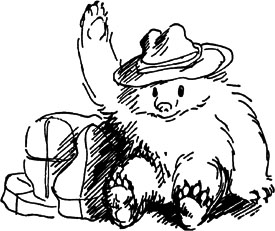
“Your jars get sticky?” repeated the auctioneer, passing a hand over his forehead. It really was a most unusual day. Things hadn’t gone at all according to plan. Some items had been sold for far more than he had ever expected. Others – like the preserves stand -were fetching nothing at all. He had a nasty feeling it had something to do with the young bear in the front row. He seemed to have a very powerful stare and he’d done his best up to now to avoid catching Paddington’s eye.
“Come, come,” he said, giving a high-pitched laugh. “I’m sure we all enjoy a little joke. Let’s start again. Now – what am I bid for this valuable item?”
“Nine pence,” said a voice at the back of the hall amid laughter.
“Ten pence,” said Paddington firmly.
The laughter died down and there was silence. “If you ask me,” whispered a voice behind Paddington, “that young bear knows something.”
“It’s probably a fake,” whispered another voice. “After all – it’s not the first thing he’s bought this afternoon.”
“He’s with old Mr Gruber, too,” whispered the first voice. “And he said he was interested in antiques when he came in. I wouldn’t touch it if I were you.”
The auctioneer shuddered as he gazed at the preserves stand in his hand. “Any advance on ten pence?” he cried.
There was another long silence. “Going…” he shouted, raising his hammer and looking around hopefully. “Going…” Still no one spoke. “Gone!”
He brought his hammer down on the desk with a crash. “Sold to the young bear gentleman in the front row for tenpence.”
“Thank you very much,” said Paddington, as he hurried up to the table. “I hope you don’t mind if I pay you in pennies but I’ve been saving up in case of an emergency.”
“Pennies?” said the man. He mopped his brow with a spotted handkerchief. “I don’t know,” he said, turning to his assistant. “I must be getting old. Letting young bears get the better of me at my time of life.”
“A very good bargain indeed,” said Mr Gruber admiringly, when they were outside the saleroom. He turned Paddington’s preserves stand over in his hands. “I should say it’s worth every penny of fifty pounds.”
“Fifty pounds?” exclaimed Paddington, staring at Mr Gruber. “Fifty pounds for a marmalade stand?”
“At least that,” said Mr Gruber. “I’ll put it in my window for you if you like, Mr Brown.”
Paddington thought hard for a moment. “I think I would like you to have it as a present, Mr Gruber,” he said at last. “I don’t expect you’d have bought the carpentry tools if I hadn’t been at the auction sale.”
Mr Gruber looked most affected by Paddington’s offer. “That’s very kind of you, Mr Brown,” he said. “Very kind of you indeed. But I know how fond you are of marmalade and I’d much rather you had it. Besides,” he added, “I’ve had a very good day and I think it was worth the price of the carpentry tools just to see the expression on the auctioneer’s face when you offered him ten pence for the preserves stand.”
Mr Gruber chuckled at the thought. “I don’t think he’s had many dealings with young bears before,” he said.
“I’ve said it before,” remarked Mrs Bird, later that evening, “and I’ll say it again. That bear’s got an eye for a bargain.”
The Browns were having a late supper before going to bed. Paddington’s ‘antique’ stood in the centre of the table in a place of honour. He had spent most of the evening polishing it until he could see his whiskers in the side and Mrs Bird had opened a new jar of his favourite marmalade especially for the occasion.
There was a blissful expression on Paddington’s face – that part of it which could be seen behind bread and butter crumbs and smears of marmalade.
“I think,” he announced, amid general agreement, “preserves taste even nicer when they come out of an antique.
“Especially,” he added, as he dipped his paw into the marmalade, “a ten-penny one!”
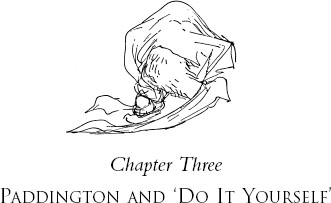
Paddington sat up in bed late that night writing his memories. He had a large leather-bound scrapbook given to him by Mr Gruber in which he kept a record of all his adventures, together with any interesting pictures, and he carefully pasted in the receipt for his ten pence which the auctioneer had given him.
“When he did eventually fall asleep it was only to dream he was at the auction sale again. He was standing in the middle of the auction rooms waving his paws and bidding for everything that was offered for sale. The pile of things he’d bought got bigger and bigger as they were placed around him until he could hardly see out. Several of the larger items were sticking in his side.
When he woke he was very relieved to find he was still in his own room and that the banging of the auctioneer’s hammer was really only someone knocking at his door.
As he sat up in bed rubbing his eyes Paddington also found to his surprise that the marmalade dish was in bed with him and he had, in fact, been lying on it.
“Paddington!” exclaimed Mrs Brown, as she entered carrying the breakfast things. “What on earth’s the matter? I kept hearing a lot of banging and shouting coming from your room in the night.”
“I expect it was the noise of the furniture, Mrs Brown,” explained Paddington, hastily drawing the sheets up round his ears so that she wouldn’t see the marmalade stains.
“The furniture?” exclaimed Mrs Brown, as she put the tray down on the bed. “What furniture?”
“The furniture I bought in my dream,” said Paddington patiently.
Mrs Brown sighed. Sometimes she couldn’t make head or tail of what Paddington was talking about. “I’ve brought you your breakfast in bed,” she said, “because Mrs Bird and I have to go out this morning. We’re taking Jonathan and Judy to the dentist and we thought perhaps you wouldn’t mind being left on your own. Unless,” she added, “you’d like to come too?”
“Oh, no,” said Paddington hastily. “I don’t think I should like to go the dentist, thank you very much. I’d much rather stay at home.”
“There’s a big box arrived from Mr Gruber,” continued Mrs Brown. “I think it’s the carpentry tools you bought in the sale yesterday. I’ve had them put in the shed.”
“Thank you, Mrs Brown,” said Paddington, hoping she would soon go as it was getting very hot under the blankets and the marmalade dish was sticking in his side again.
Mrs Brown paused in the doorway. “We shan’t be any longer than we can help. You’re sure you’ll be all right?”
“I expect I shall find something to do,” said Paddington vaguely.
Mrs Brown hesitated before shutting the door. She would have liked to ask Paddington a few more questions. He had a far-away look in his eyes which she didn’t like the look of at all. But she was already late for the appointment, and conversation with Paddington, particularly in the early morning, was liable to become complicated.
When Mrs Bird heard all about Paddington’s strange behaviour she hurried upstairs to see what was going on, but she arrived back a few moments later with the news that he was sitting up in bed eating his breakfast and reading a catalogue.
“Oh, well,” said Mrs Brown, looking most relieved. “He can’t come to much harm doing that.”
In recent weeks Paddington had begun to collect catalogues and whenever he saw an interesting one advertised in the newspapers he usually sent away for it. In fact, hardly a day went by without the postman calling at least once with a letter addressed to “P. Brown, Esq.”
Some of the catalogues were very good value indeed, full of pictures and drawings, and with quite a lot to read considering they were free and that Mrs Bird usually paid for the stamp.
Paddington kept them all in a cupboard beside his bed. There were a number on foreign travel – with pictures of far-away places in several colours; two or three on food; and one or two from some big London stores.
But the one which interested Paddington at the moment, and which was his favourite, showed a work-bench on the front cover and was headed DO IT YOURSELF. He became so absorbed in the booklet, which was a thick one full of diagrams, that he suddenly found to his surprise that he had put the pepper and salt into his cup of tea and the sugar into his boiled egg. But it made quite an interesting taste so he didn’t really mind and he concentrated on reading the catalogue over his toast and marmalade.
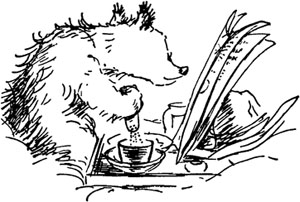
There was a particularly interesting section which caught his eye. It was headed DELIGHT YOUR FAMILY AND SURPRISE YOUR FRIENDS, and it was all about making a newspaper and magazine rack.
“All you need,” it said, “is a sheet of plywood, some nails and a kitchen table.”
Paddington wasn’t at all sure about using Mrs Bird’s kitchen table, but the night before, Mr Brown had rashly promised him a sheet of plywood that was standing in the shed, as well as some old nails in a jam-jar. And Mr Brown was always grumbling about not being able to find his newspapers; Paddington felt sure he would be very pleased if he had a rack for them.
He examined the drawings and pictures carefully and consulted the instructions several times. It didn’t say anything about bears in particular doing it themselves, but it did say it was suitable for anyone with a set of carpentry tools.
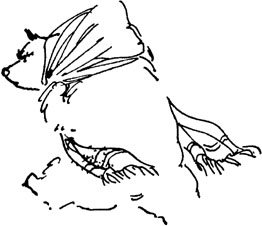
Paddington came to a decision. He hastily wrapped the remains of his breakfast in a handkerchief in case the sawing made him hungry. Then, having marked the chapter on magazine racks in his catalogue with a piece of marmalade peel, he hurried along to the bathroom for a quick wash.
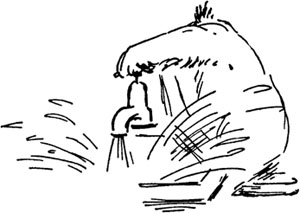
Paddington wasn’t the sort of bear who believed in doing things unnecessarily and it wasn’t worth having a proper wash if he was going to get dirty again. After passing the face flannel over his whiskers a couple of times he made his way downstairs and went out into the garden.
The box of carpentry tools was standing in the middle of Mr Brown’s shed and Paddington spent several minutes investigating it. Although all the tools seemed rather large for a bear he soon decided he was very pleased with them. There was a hammer, a plane, three chisels, a large saw and a number of other things which he didn’t immediately recognise but which looked very interesting. The box was heavy and it took him some while to drag it outside into the garden. He had even more trouble with Mr Brown’s plywood, for it was a large sheet and there was a wind blowing. Each time he picked it up a gust of wind caught it and carried him farther and farther down the garden.
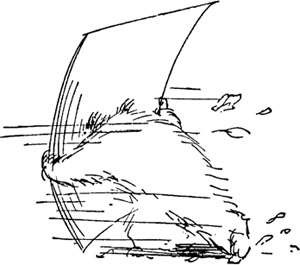
It was while he was trying to drag it back up again with the aid of a piece of rope that he heard a familiar voice calling his name. He looked round and saw Mr Curry, the Brown’s next-door neighbour, watching him over the fence. Mr Curry didn’t approve of bears and he usually viewed Paddington’s ‘goings on’ with suspicion.
“What are you doing, bear?” he growled.
“Do it yourself, Mr Curry,” said Paddington, peering out from behind the sheet of wood.
“What?” bellowed Mr Curry. “Don’t be impertinent, bear!”
“Oh, no,” said Paddington hastily, nearly dropping the sheet of plywood in his fright at the expression on Mr Curry’s face. “I didn’t mean you were to do it yourself, Mr Curry. I meant I’m going to do it myself. I’m making a magazine rack for Mr Brown.”
“A magazine rack?” repeated Mr Curry.
“Yes,” said Paddington importantly, and he began explaining to Mr Curry all about his new carpentry set.
As he listened to Paddington the expression on Mr Curry’s face gradually changed. Mr Curry had a reputation in the neighbourhood for meanness and he was always on the look-out in the hope of getting something for nothing. He was very keen on doing things himself, too, in order to save money, and he cast several envious glances at Paddington’s tool set.
“Hmm,” he said, when Paddington had finished. “And where are you going to make this magazine rack, bear? On the lawn?”
“Well,” said Paddington doubtfully, “It’s a bit difficult. It says in the instructions I’m supposed to have a kitchen table and Mrs Bird’s is full up.”
“Hmm,” said Mr Curry once again. “If I let you make me a magazine rack, bear, you can use my kitchen table.”
“Thank you very much, Mr Curry,” said Paddington. But he wasn’t sure whether it was a good idea or not and he looked at Mr Curry rather doubtfully. “That’s most kind of you.”
“I have to go out this morning,” said Mr Curry. “So you can have it ready for me when I get back.
“Mind you,” he added, as he reached over the fence to give Paddington a hand with the plywood, “I’m not having any sawdust over the kitchen floor. And mind you don’t scratch anything.”
The more he listened to Mr Curry talking the longer Paddington’s face grew and he was glad when at last he left to do his shopping.
But as Paddington set to work he soon forgot all about Mr Curry’s list of ‘don’t’s, for there were a number of important things to be done. First of all he took a pencil and ruler and carefully marked out the shape of the magazine rack on the sheet of plywood. Then he placed this on top of the kitchen table, ready to be sawn in two.
Paddington had never actually sawn anything before, but he’d often watched Mr Brown cutting up logs for the fire. From a safe distance it had always looked easy – but Paddington soon found it wasn’t easy at all. To start with, the plywood was bigger than the top of Mr Curry’s table. Being small, Paddington had to climb on top of it and several times it nearly tipped over when he stood too near the edge. Then he found that the saw, although it was nice and sharp, was so large he had to use both paws, which made things even more difficult. For the first few strokes it went through the wood like a knife through butter, but for some reason or other it gradually became harder and harder to use.
After sitting down for a short rest Paddington decided to try starting from the other end. But once again, for some strange reason, he found it much easier at the beginning. However, as he gave the last saw cut and scrambled clear he was pleased to see the two saw cuts met in the middle, dividing the sheet of plywood neatly in half.
It was then, as he reached up to take the newly sawn pieces of plywood down, that Paddington had his first shock of the morning.
There was a loud splintering noise and he dodged back just in time to avoid being hit by Mr Curry’s table as it suddenly parted in the middle and fell with a crash to the floor.
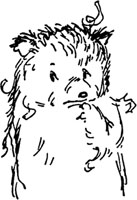
Paddington sat in the middle of the kitchen floor with a mournful expression on his face for quite some time, surveying the wreckage and trying to think of a good reason why Mr Curry would like two small tables with only two legs each instead of one big one with four legs.
He consulted the instructions in his catalogue hopefully several times, but there didn’t seem to be anything about mending tables which had accidentally been sawn in half. In all the pictures the people seemed to be happy and smiling and their kitchens were as shiny as a new pin. Whereas, looking unhappily around Mr Curry’s kitchen, even Paddington had to admit it was in a bit of a mess.
He tried propping the two pieces of table up on some old cardboard boxes, but there was still a nasty sag in the middle, and even with the curtains drawn and the light out it was obvious something was wrong.
Paddington was a hopeful bear in many ways and he suddenly remembered seeing a large tube of glue in his carpentry set. If he spread some of the glue along the two edges and nailed them together for good measure, perhaps even Mr Curry might not notice anything was wrong. He worked hard for some minutes and by the time he had finished he felt quite pleased with himself. Admittedly the table had a funny tilt to one side and seemed a trifle wobbly, but it was definitely in one piece again. He spread some flour over the join and then stood back to admire his handiwork.
Having carefully examined it from all angles, he decided he might be able to improve matters still further by sawing a piece off one of the legs. But when he had done that the table seemed to lean the opposite way – which meant he had to saw a piece off one of the other legs as well. Then, when he had done that, he discovered the table was leaning the other way again.
Paddington gave a deep sigh. Carpentry was much more difficult than it looked. He was sure the man in the catalogue didn’t have so much trouble.
It was after he had been at work for some time that he stood up and received his second shock of the morning.
When he had first started sawing the legs, Mr Curry’s table had been as tall as he was. Now he found he was looking down at it. In fact, he didn’t remember ever having seen such a short table before and his eyes nearly popped out with astonishment.
He sat down on the pile of sawn-off table legs and consulted his catalogue once again.
“Delight your family and surprise your friends!” he said bitterly, to the world in general. He was quite sure Mr Curry would be surprised when he saw his kitchen table, but as for anyone being delighted by their magazine racks – he hadn’t even started work on those yet.
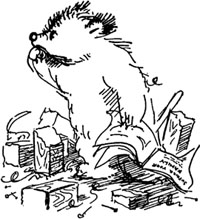
Mrs Brown looked anxiously at the dining-room clock. “I wonder where on earth Paddington can have got to,” she said. “It’s almost lunch time and it’s most unlike him to be late for a meal.”
“Perhaps he’s doing a job somewhere,” said Jonathan. “I looked in the shed just now and that new tool box of his has disappeared.”
“And that sheet of plywood Daddy gave him,” said Judy.
“Oh dear,” said Mrs Brown. “I do hope he hasn’t built himself in anywhere and can’t get out. You know what he’s like.”
“I don’t know about Paddington building himself in,” exclaimed Mrs Bird, as she entered carrying a trayload of plates. “I think Mr Curry must be having his house pulled down. I’ve never heard so much noise. Banging and sawing coming from the kitchen. It’s been going on ever since we got back and it’s only just this minute stopped.”
Jonathan and Judy exchanged glances. Now that Mrs Bird mentioned it, there had been a lot of noise coming from Mr Curry’s house.
“I wonder…” said Judy.
Jonathan opened his mouth, but before he had time to say anything the door burst open and Paddington entered dragging something large and heavy behind him.
“Well,” said Mrs Bird, voicing all their thoughts. “And what have you been up to now?”
“What have I been up to, Mrs Bird?” exclaimed Paddington, looking most offended. “I’ve been making Mr Brown a magazine rack.”
“A magazine rack?” said Mrs Brown, as Paddington stepped to one side. “What a lovely idea.”
“It was meant to be a surprise,” said Paddington modestly. “I made it all with my own paws.”
“Gosh! It’s super,” said Jonathan, as the Browns all crowded round to admire Paddington’s handiwork. “Fancy you doing it all by yourself.”
“I should be careful,” warned Paddington. “I’ve only just varnished it and it’s still a bit sticky. I think some of it has come off on my paws already.”
“Most sensible,” said Mrs Bird approvingly. “Mentioning no names – it’s about time some people in this house had a place for their newspapers. Now perhaps they won’t keep losing them.”
“But you’ve made two,” said Judy. “Whose is the other one?”
A guilty expression came over Paddington’s face. “It’s really for Mr Curry,” he said. “But I thought perhaps I’d better leave it on his doorstep after dark – just in case.”
Mrs Bird looked at Paddington suspiciously. Her ears had caught the sound of violent banging coming from the house next door and she had a nasty feeling in the back of her mind that it had something to do with Paddington.
“Just in case?” she repeated. “What do you mean?”
But before Paddington had time to explain exactly what he did mean, Mrs Brown pointed to the window in astonishment.
“Good gracious,” she cried. “There is Mr Curry. Whatever’s the matter with him? He’s running around the garden waving a kitchen table in the air.” She peered through the glass. “And it doesn’t seem to have any legs, either. How very odd!”
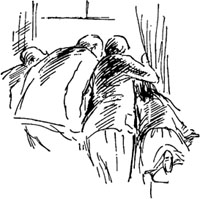
“Gosh!” cried Jonathan excitedly. “Now it’s broken in two!”
The Browns stared through the window at the strange sight of Mr Curry dancing round his pond waving the two halves of a table. “Bear!” he shouted. “Where are you, bear?”
“Oh dear,” said Paddington, as everyone turned away from the window and looked at him accusingly. “I’m in trouble again.”
“Well, if you ask me,” said Mrs Bird, after he had explained everything to them, “the best thing you can do is offer Mr Curry your carpentry set as a present. Then, perhaps, he’ll forget all about his kitchen table. And if he doesn’t, just you tell him to come and see me.
Mrs Bird held very strong views about people who tried to take advantage of others and she usually took Paddington’s side in anything to do with Mr Curry.
“Anyway,” she concluded, in a voice which left no room for argument, “I’m certainly not having the lunch spoiled by Mr Curry or anyone else, so just you all sit down while I fetch it.”
With that argument the Browns had to agree and they meekly arranged themselves round the table.


